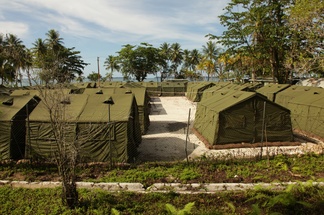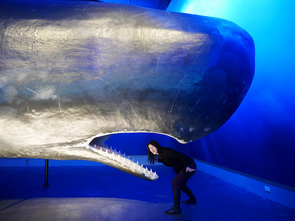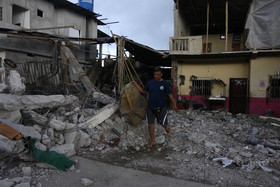 Manus prison camp Manus prison camp Papua New Guinea(PNG) has slapped the politicians who made one of their islands a for hire prison camp. Since 2014 Australia has been diverting migrants/refugees to their country to camps, one of which is located on Manus Island. Currently about 850 men are being held in a camp formerly used by Australian military. The sequestering of people there against their will has been deemed illegal by the PNG supreme court. "The detention of the asylum seekers on Manus Island in Papua New Guinea… is unconstitutional and illegal," it said. BBC It ordered that immediate action be taken. While another Pacific island, Nauru, also has a prison camp on it, this looks as if the “Pacific Solution” is coming to an end. The camp is run by a private firm which restricts access by human rights workers and by journalists. They could not refuse a UN inspection team which criticized the conditions. Australia’s Immigration Minister Peter Dutton has declared that the PNG ruling makes no difference in that Australia will not allow migrants to come to Australia “illegally”. Many of those currently in the PNG prison camp are deemed refugees. Dutton has declared that they won’t be coming to Australia. He went on to advise those that are genuine refugees that they should settle in PNG in spite of the hostility shown to them by the islanders. In 2014 the camp and the prisoners were attacked by locals. Another option for those judged genuine refugees is that they would be allowed to emigrate to Cambodia. Cambodia is currently not killing all who wear eyeglasses. Australia has other immigration detention centres within the country. Nine are located in the country, including on sweetly named Christmas Island. Sources: The Washington Post BBC News CNN Wikipedia
1 Comment
 Cheater Cheater Belgian cyclo-cross rider Femke Van den Driessche has been hit with a six year suspension for cheating. The Union Cycliste International (UCI) has also removed her name from last year’s winnings and slapped her with a hefty fine and orders to return her prize monies. At the world championship cyclocross meet in January, Van den Driessche had the bad luck to have her bike scanned with new technology. The scan turned up a tiny motor. She has now the distinction of being the first person officially charged with mechanical cheating. Van den Driessche announced her retirement from professional cycling in March. The 19 year old is paying the price for mechanical cheating, but with the cost of doping the bike hovering in the 50 000 Euro mark, it makes me wonder if there is more to this story. About 100 bikes were tested during the meet using technology that detects magnetic fields. The UCI has been using this method to detect the tiny cheats since enacting strict penalties for mechanical cheating. A team in Italy have developed a different method for detecting motors in operation using a thermal camera. When the motor is operating small amounts of heat are produced and can be detected with sensitive equipment. It seems that even the high tech equipment can be fooled. Inventor and developer of very small bicycle motors, Stefano Varjas, is confident that his devices are very stealthy. “If you have this system, you can stay with the group, but nobody hears it, nobody sees it, nobody knows about it,” he said of the devices Professional cycling has been battling cheating with spotty success. Focus has been on doping of the athletes themselves. Ever more sophisticated tests have been devised to check body fluids for banned substances. Rumours of tiny motors in bikes have been circulating for a few years and some riders who seem to make miraculous comebacks and find reserves of energy on a mountain climb have spurred the UCI to consider their possible use in a race. Cycling season 2016 is well underway. Two weeks from now the first of the grand tours begins. The Giro d’Italia is a grinding three week affair that tests men and equipment. The UCI officials with their hand held devices and ipads are likely to become a familiar sight to fans of professional cycling. Sources: Velo News Cycling News New York Times  Model of sperm whale Model of sperm whale Whales in the North Sea have been beaching themselves. Since the beginning of the year 30 whales have been found on beaches in the UK, Netherlands, France and Germany. Thirteen of them washed up on Germany’s northern coast. Necropsies to try to determine the cause of death for these leviathans were inconclusive but biologists were shocked to find so much plastic garbage in their stomachs. One whale had a 13 metre(43 ft.) fishing net in its stomach. These large whales depend on squid for their diet. While there was a great deal of plastic garbage in the dead whales’ stomachs, it did not appear to be the cause of death. The whales, all males between 10 and 15 years, were in generally good condition. The best guess is that the whales during their migration north took a wrong turning and found themselves in shallow water. Once they were stuck on the sand, their great weight doomed them. Whales can die from a variety of human causes. Collisions with freighters, disorientation from loud sonic booms, toxic pollution, hunting are a few. A large study looking at beached baby dolphins in the Gulf of Mexico which compared beached neonates in an area hard hit by the massive oil spill with some found in areas not affected by the oil. Those found in the affected area showed many more defects both externally and internally. Those of us on the west coast of Canada have developed an affection for our resident Orca whales. The Southern resident group ranges into the US waters as well. A tagging project under the auspices of NOAA has come under suspicion as being at least partly to blame for the death of one or more of the Orcas. A 20 year old male was found washed up on the west coast of Vancouver Island with its dart still sticking out of it. The questionable practice of darting was supposed to see the dart break off leaving telemetry inside. Two other whales have gone missing. Reports of infections around the wound sites have also been reported. Canada Fisheries and Oceans does not use this method for tracking the endangered animals. A series of underwater listening posts track the individuals. On a brighter note, humpback whales normally confined to the Pacific Ocean are increasingly finding their way to the Atlantic via the Arctic Ocean, meeting their long lost Atlantic cousins for the first time in about 5 000 years. Sources: National Geographic CBC News  Devastation in Ecuador earthquake Devastation in Ecuador earthquake The 7.8 level earthquake that struck the Pacific coast of Ecuador a week ago continues to claim victims. To date, there are 646 dead, 130 missing and 12 500 injured. The damage to homes and infrastructure runs in the billions. The massive earthquake struck at the eastern edge of the Pacific plate where it slides under the South American plate. It was felt strongly in Quito located inland in the mountains. For awhile a tsunami warning was issued, but fortunately, none resulted. The area has been shaken by more than 700 aftershocks, some of them powerful in their own right. On Thursday a 6.0 quake rocked the coastline. The country is trying to deliver clean water, food and emergency supplies, but damage to roadways is making the task difficult. Earthquakes occur when the Earth’s tectonic plates shift suddenly. The Earth is a dynamic planet and the crust is constantly shifting. When a large shift occurs rapidly, it causes earthquakes. The Pacific plate is diving below the S. American and N. American plates. Earthquakes and mountain building as well as volcanoes result. Two days after the 7.8 quake in Ecuador, the famous Mexican volcano, Popocatepetl erupted sending smoke and ash into the air. It settled down again after a few hours. Many other volcanoes line the west coasts of the Americas. Some are extinct, some dormant, but some are quite active. Popocatepetl is one of them. It is particularly dangerous as a full-fledged eruption could threaten Mexico City which has a population of about 25 million. The rebuilding efforts must begin, but the country of 16 million is facing hard economic times. They rely heavily on their oil revenues to run the country, but have been hit with lower prices and lower demand for their product. President Rafael Correa has announced a 2% increase in the sales tax as well as measures to levy a charge against those making more than the equivalent of USD$1000 per month, ranging from one day’s wages to a portion of total wealth. Sources: Al Jazeera CBC News  Time is running out Time is running out A bike path constructed as part of the heritage building for the Brazil 2016 Olympics has failed after less than four months, taking at least two lives. The structure is part of an interconnecting system of bike and walking paths that allow the residents of Sao Conrado to traverse the city without having to interact with motorized traffic. The path was built high above the beach area facing the Atlantic Ocean. It was touted as the “most beautiful bike path in the world”. Yesterday a whole section of the 3.9km path fell to the beach when a rogue wave hit it. It was reported that large waves were rolling in from the ocean and hitting the cliffs. A witness to the failure of the pathway reported that a particularly large wave lifted a section and it fell taking five people with it. One person was rescued. Two bodies were recovered and two are still missing. Photographs of the failed section show a complete section gone. There are no remnants or rebar hanging. The connector to Olympic venues cost the Brazilian taxpayers nearly USD$13 million. “I almost died,” Guilherme Miranda told the Globo newspaper. “Where’s the mayor, where’s the engineer who did this work? It’s appalling to see people dying in front of you. Someone has to give a response for that 45 million [reais]. It just opened and is already cracked in several places.” The Guardian The preparations for the Rio games have received a great deal of criticism. The cycling match to test out the new velodrome has had to be cancelled because the facility is still not finished. Other facilities have been cut back or eliminated causing the IOC to make statements of concern. Those facilities may lack sufficient electricity if the supply is not assured soon. The water sports have had a great deal of publicity because of the stinky condition of the venues. Much of the sewage and garbage for the host city is disposed of directly into ditches and waterways. This year’s Olympics are the first awarded to a country south of the Equator. When Brazil was awarded the sports extravaganza their economy was surging ahead and the political situation seemed stable. Times have changed. Plummeting oil prices have hit their economy, corruption has siphoned off billions and the president has just faced a hostile government coalition that has voted to impeach her. Sources: The Guardian UK Cycling News |
Barbara McPherson
Blogger, gardener, farmer. Working toward food security and a 30 foot
diet. Addicted to reading. Love this planet, especially my little corner
on Vancouver Island, Canada Archives
October 2016
Categories
All
|

